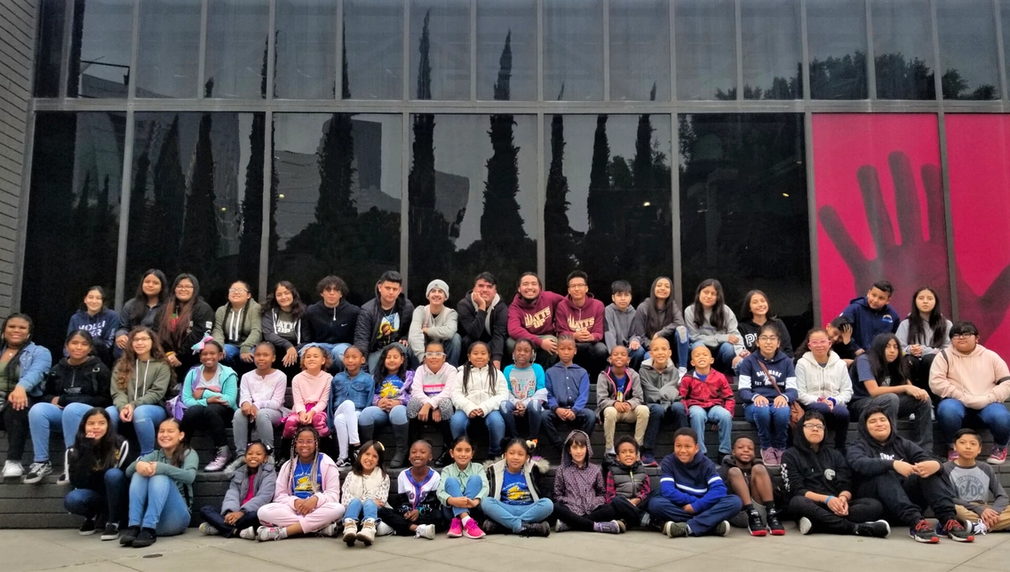Academic, Trauma-informed Programming for Underrepresented Youth
IHADLA uses a comprehensive program model to serve entire grade levels of underrepresented students for 12+ consecutive years from first grade to their first post-secondary job, helping them effectively navigate an educational pathway to an empowered future. We offer academic STEAM support; college and career readiness and exploration; enrichment field trips; life skills development; parent engagement; mentorship; internships; social-emotional learning; case management; and college tuition support of up to $8,000 per student.

What is the primary issue area that your application will impact?
Youth Economic Advancement (sponsored by Funding Partner, TBA)
In which areas of Los Angeles will you be directly working?
Central LA
East LA
South LA
West LA
In what stage of innovation is this project, program, or initiative?
Expand existing project, program, or initiative
What is your understanding of the issue that you are seeking to address?
Youth living in the underserved L.A. communities of Boyle Heights, Watts, and Inglewood are less likely to complete high school in four years, if at all, compared to both state and national averages. The non-completion rates for Boyle Heights, Watts, and Inglewood are 55%, 49%, and 27%, respectively. Statistically, students who don't complete high school are subjected to increased experiences of poverty and crime. They are four times more likely to be unemployed and over eight times more likely to be incarcerated. Even once students from these communities attend college, studies have shown that BIPOC students are much less likely to complete their college education than their peers from different neighborhoods. Furthermore, in addition to the typical risk of academic stagnation our population faces during the summer months, the pandemic and amplified digital divide have increased the obstacles our students face in achieving their academic, personal, and professional goals.
Describe the project, program, or initiative this grant will support to address the issue.
IHADLA's model combines academic, social-emotional, and enrichment programming to bolster student progress and impact educational equity for underserved communities. Grant support allows us to continue with our students and potentially a new cohort of 1st graders in fall of 2023. Our selection process, breadth of services, and virtual component are unique, increasing capacity to serve. When sponsoring a new program, we select a school's entire 1st-grade level, despite academic performance, and students remain eligible even if they move out of area. We connect them with the tools required to bridge educational inequities and beat the systemic odds against them through year-round programming, including daily after-school support with homework help, SEL, STEAM workshops, enrichment, and college field trips. We provide mental health services and therapy through USC MSW interns and partners, career exposure through our Dream Speaker and Mentor programs to build relationships and network with professionals from various industries, and annual Summer Academy and Home Visit access to identify need and drive offerings. We ensure college readiness by assisting with the application, test prep, financial literacy, and academic counseling. After high school completion, we provide ongoing support as they transition into college or career, offering educational workshops to instruct them on navigating campus issues, managing stress, building community, and exploring career goodness of fit.
Describe how Los Angeles County will be different if your work is successful.
Our primary objective is to empower underserved youth and ensure they have an opportunity to become independent and informed adults who give back to their communities, thus addressing inequalities and creating a more just society. IHADLA's comprehensive, long-term program model allows for deep relationship building between our staff and students and extends to their families, teachers, and community members. The presence of our program at host schools leads to collaboration and relationship building between our staff, teachers, and school administrators. By joining forces with other educators, our team, and CBO partners, we create the opportunity for academic and systemic change in the school environment. With the constant growth of our offerings and numbers through expansion, we intend to improve high school graduation completion, matriculation and persistence rates, college access and completion, leading to improved career opportunities and community strength.
What evidence do you have that this project, program, or initiative is or will be successful, and how will you define and measure success?
IHADLA utilizes comprehensive outcomes and data management software to track and evaluate data on its students and measure the success of academic programs and support. Program Coordinators input data on each student's attendance and academic performance (GPA, test scores, grade level proficiency), as well as case management notes and home visits. The Director of programs uses the data to produce quarterly dashboard reports reviewed and evaluated by our Programming Committee and Board. Data-driven programming allows IHADLA to enhance its agility in anticipating challenges and tailor programming based on students' needs. Our proven track record demonstrates success: 98% of our Class of 2018 and 96% of the Class of 2019 graduated high school on time, with an 80% matriculation rate; 99.6% of younger students remained enrolled the 2022 academic year despite accelerated withdrawals across greater LA districts. In 35 years, we've reached over 11k+ people, evidence of our ripple effect.
Approximately how many people will be impacted by this project, program, or initiative?
Direct Impact: 380
Indirect Impact: 500